Billboards
Nati-anal Airlines
Joshua Alper's 1978 book, The Documentary Record of an Infringement, documents his "pseudovandalist" alteration of a damaged billboard to make it read "anal Airlines."Pre-alteration and damage, the billboard was for National Airlines, which is now defunct.
The book is quite rare, but you can get a copy for $100.
I haven't been able to find a picture of the billboard post-alteration, and I'm not going to pay the money for his book.



Posted By: Alex - Thu Nov 07, 2024 -
Comments (0)
Category: Books, Air Travel and Airlines, 1970s, Billboards
Smoking Facts
Seemed odd to me that the ad would not only mention that they've got "a patent on flavor," but also give the patent number (3828800). So I had to look it up. Turned out to be a fairly boring patent for "an improved cigarette filter material... formed from the porous, granular salt of a weakly basic anion exchange resin."
Sports Illustrated - Nov 14, 1977
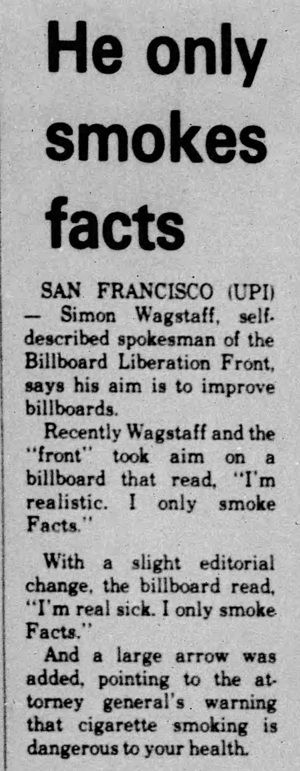
Coos Bay World - Nov 4, 1978
Posted By: Alex - Wed Mar 13, 2024 -
Comments (0)
Category: Advertising, Patents, Smoking and Tobacco, 1970s, Billboards
Welcome To Gila Bend
I've driven through the small town of Gila Bend many times, because it's on the road between Phoenix and San Diego which I drive fairly often. But I only recently realized that it has a weird welcome sign: "Gila Bend welcomes you. Home of 1917 friendly people and 5 old crabs."The 5 old crabs are listed: Earl Carpenter, Clyde Kreeger, Scott Smith, Peggy Perry, and Pat Lauderdale.
From Wikipedia:

Posted By: Alex - Sun Mar 12, 2023 -
Comments (4)
Category: Signage, Billboards, Arizona
Oakland Ballet Battles Virginity
1995: In an effort to attract new customers, "including singles, sports-minded men and female shopping-mall patrons," the Oakland Ballet put up billboards that displayed the message, "Go ahead, take another date to miniature golf, and die a virgin. Oakland Ballet. You just might like it."I can understand that the ads were meant to be controversial, but what was with the weird dig at miniature golf?
More info: LA Times

Sacramento Bee - Nov 23, 1995
Posted By: Alex - Mon Mar 29, 2021 -
Comments (3)
Category: 1990s, Billboards
Stinker Station Signs
Stinker Stations were (and still are) a chain of gas stations in Idaho. Their corporate symbol was a skunk. During the 1950s they adopted an oddball advertising campaign which involved posting yellow signs with strange messages along the side of roads. Most of the signs were removed after the passage of the Highway Beautification Act in 1965.More info: Vintage Everyday




Posted By: Alex - Mon Mar 08, 2021 -
Comments (3)
Category: Signage, Billboards, Advertising, 1950s, 1960s
Spaghetti Jesus
May 1991: many motorists claimed they could see the face of Jesus in a Pizza Hut billboard outside of Atlanta.I do see a face, but it doesn't look anything like a Jesus face to me.


Owensboro Messenger-Inquirer - May 26, 1991
Posted By: Alex - Sun Jan 12, 2020 -
Comments (4)
Category: Religion, 1990s, Billboards, Pareidolia
Every body needs milk
In 1969, the dairy industry launched an advertising campaign with the slogan, "Every body needs milk."In Oregon, the marketing team decided to conduct an experiment to find out whether showing more skin on a billboard would attract more attention. To do this, they created two different versions of an image. Both showed an attractive young woman lying down, feeding milk to a kitten. But in one version she was wearing slacks and a long-sleeved blouse. In the other, she was wearing a bikini.
It took me a lot of searching, and I wasn't able to find very good-quality copies, but I believe these are the two different billboard scenes:
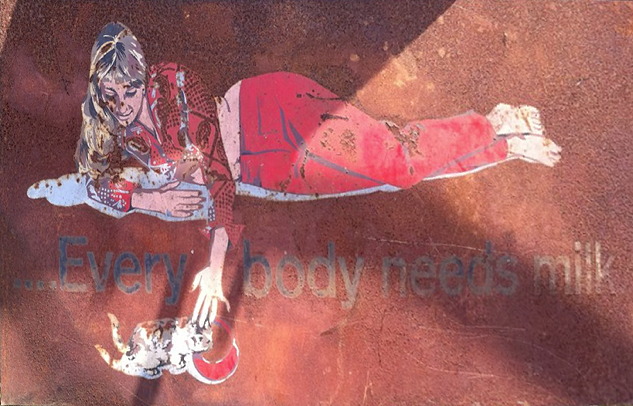
Source: Flickr
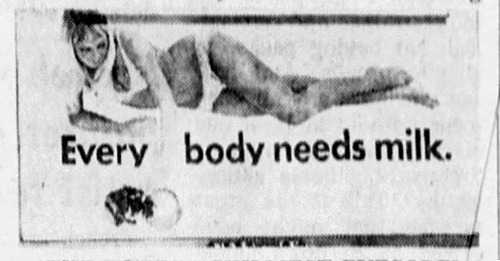
Minneapolis Star - Feb 20, 1970
So, did one billboard attract more attention than the other? The marketers surveyed 231 teenagers and concluded that there was "no indication that the amount of clothing made any difference in the awareness."
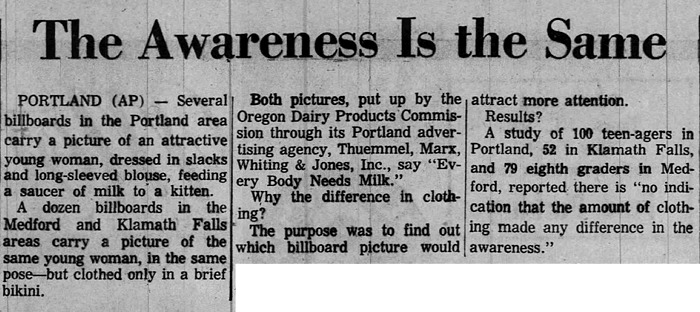
Salem Capital Journal - May 6, 1970
That was their conclusion, but I'm not sure I believe them, because the rest of the marketing campaign focused heavily on bikini-clad models. Two examples below.
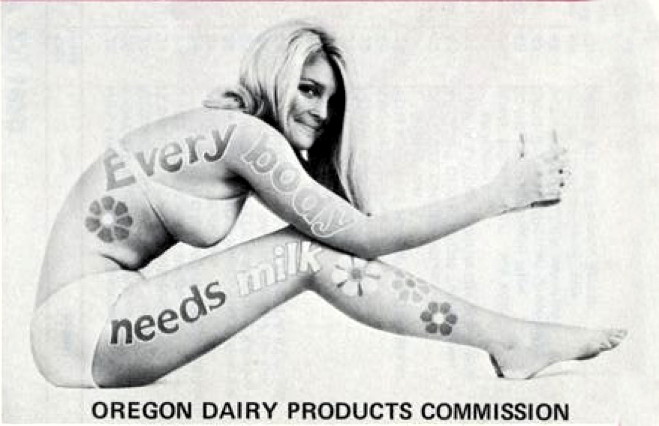
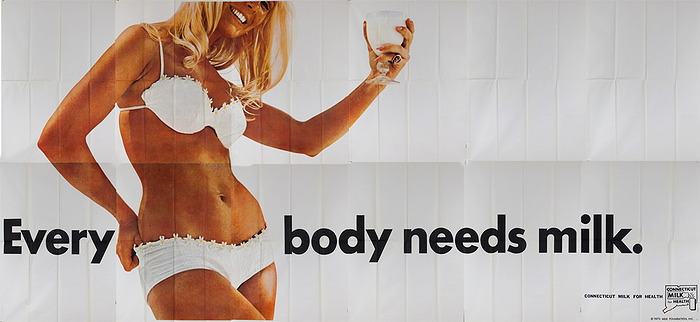
They even made it possible to buy the bikini-themed images as a poster and towel. Which suggests the bikini billboards did attract more attention.
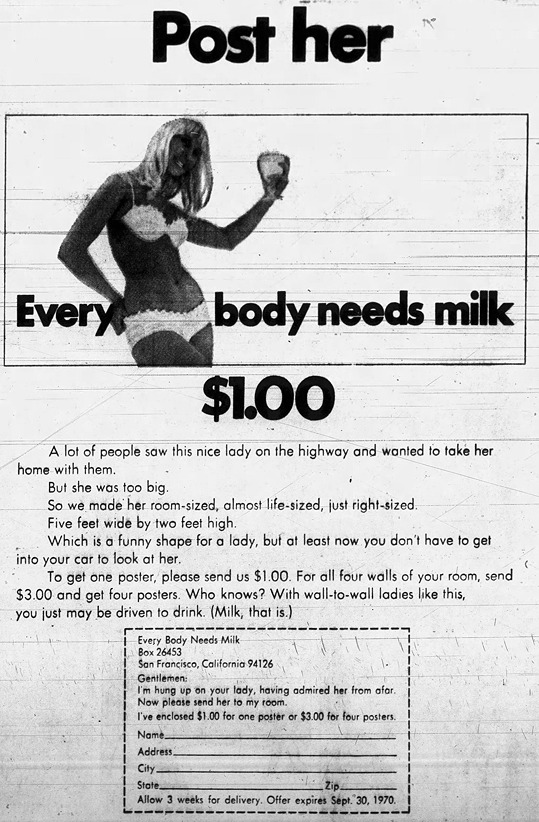
Oakland Tribune - May 24, 1970
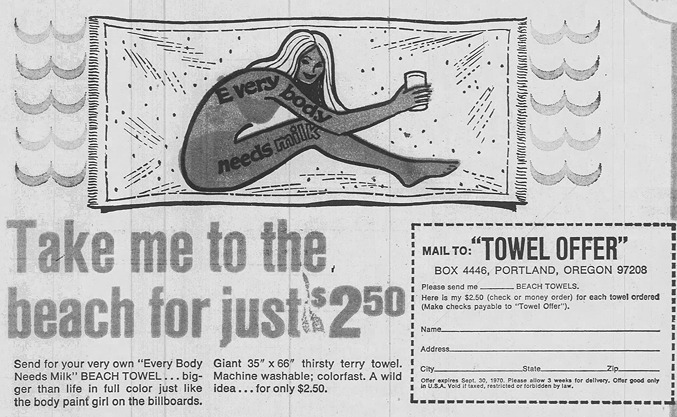
The Capital Journal - June 3, 1970
Posted By: Alex - Thu Aug 22, 2019 -
Comments (4)
Category: Advertising, 1970s, Billboards
Your wife is hot

A controversial billboard for air conditioning recently appeared in Nottingham. It declared, "Your wife is hot." According to the BBC:
This made me wonder, which 1950s-era ad exactly was it like? Perhaps the "recipe for boiled wife" ad that we recently posted about.

Posted By: Alex - Wed Jul 31, 2019 -
Comments (3)
Category: Advertising, Gender, Billboards
Billboards in space
If Russian company StartRocket has their way, there will soon be no escaping ads. They plan to display them in the sky, from satellites. They hope to have them up and running by 2021.More details
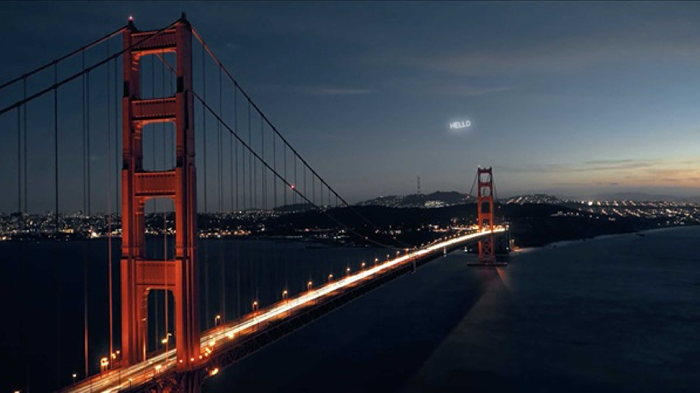
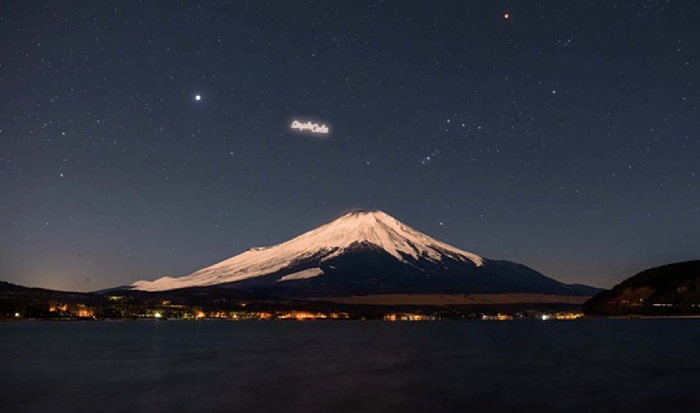
Posted By: Alex - Sat Feb 09, 2019 -
Comments (8)
Category: Spaceflight, Astronautics, and Astronomy, Advertising, Billboards
When Billboards Become Visible
If you're in the billboard business you'd probably want to know exactly when a billboard becomes visible to drivers. So in 1953 research was conducted at the Iowa State College Experiment Station to get an answer to this question. The study involved having subjects watch miniature billboards slowly approach on a conveyor belt.Source: Duke University Libraries - Archives of the Outdoor Advertising Association of America.
The Duke University blog also notes that in 1958 "The OAAA commissioned Jack Prince, a professor of ophthalmology at Ohio State University, to study the visual dynamics of outdoor advertising, resulting in the first legibility studies of ad copy." I'm not sure how these two studies related to each other. They sound suspiciously similar. And the 1958 studies obviously weren't the first given that the pictures below show research labeled as happening in 1953.




Update: The researcher in the photos is probably Dr. A.R. Lauer of Iowa State's Department of Psychology, and he may have been studying the phenomenon of "Highway Hypnosis."
In the early 1950s there was increasing criticism of the proliferation of billboards along the side of roads. People complained that they were ugly and possibly distracted drivers. So the OAAA sponsored Dr. Lauer to research the safety benefits of billboards, and specifically whether billboards distracted drivers.
Lauer came up with the result that the billboards did distract drivers, but that this was a good thing because it saved them from Highway Hypnosis —entering a trance-like state as they stared at endless, monotonous roads.
The OAAA then took out ads in newspapers promoting Lauer's research and the safety benefits of billboards.

The Des Moines Register - Mar 23, 1958
Posted By: Alex - Fri Jan 20, 2017 -
Comments (9)
Category: Advertising, Experiments, 1950s, Billboards

| Who We Are |
|---|
| Alex Boese Alex is the creator and curator of the Museum of Hoaxes. He's also the author of various weird, non-fiction, science-themed books such as Elephants on Acid and Psychedelic Apes. Paul Di Filippo Paul has been paid to put weird ideas into fictional form for over thirty years, in his career as a noted science fiction writer. He has recently begun blogging on many curious topics with three fellow writers at The Inferior 4+1. Contact Us |




